Civilization V Tutorial: Learning to Play
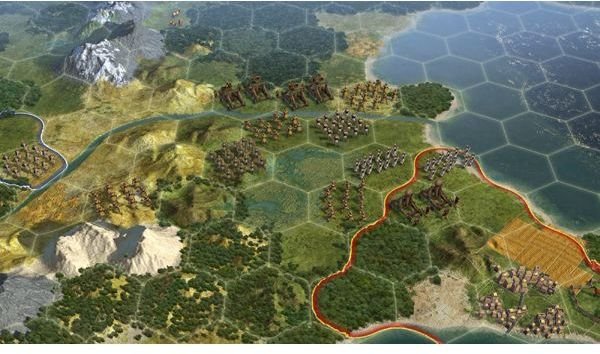
The Complete Civilization 5 Guide: Getting Started
Running a civilization is difficult. Everyone wants something. Your citizens are constantly begging for more – more luxury goods, more food, and wealth. And then there are the other powers that, more often than not, treat you as nothing more than a means to an end.
Although Civilization 5 is very easy on the lower difficulty levels it can still be difficult and frustrating to figure out how to manage your cities. This guide, the first part of the complete Bright Hub Civilization 5 guide, will help you figure out how to play the latest addition to the Civilization series.
Settling Your First City
All games of Civilization 5 start the exact same way (unless you modify the game settings or use a mod). You begin with one settler and one warrior, hanging out in the middle of nowhere, with no real direction.
It is up to you to found your capital city. This is actually an important task because your capital city will probably be your most prosperous. Many game bonuses apply only to your capital city and the domination victory type depends on your ability to defend your capital.
With that said, however, you shouldn’t wander endlessly. It is best to settle within ten turns. This shouldn’t be too difficult because the game tries to make sure that every player has a reasonably good place to start nearby. Use your warrior and settler to scout. If you see any nearby hills, climb them. A unit on a hill has better line of sight.
The best spot to found a city is a location that has immediate access to several tiles that generate a good amount of food. Look for grasslands. Also try to include a hill, as you can mine it for an early production bonus. Finally, look for luxury resources. Some tiles include things like gems, cotton, or silk. These will quickly become very valuable.
Avoid deserts and an excessive number of hills. As a new player I also suggest avoiding the ocean. Empires based on sea power can be very strong, but I think they’re a bit harder to cultivate and manage, so I suggest avoiding that for now.
The Early Years
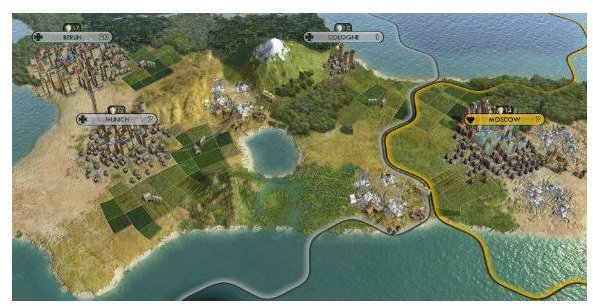
Once you have your first city up and running you’ll be able to start production of a new unit and you’ll be able to begin your research. I’m not going to delve too deeply into the research element of the game yet – that will be handled later in the guide – so let’s just talk about production.
The first thing coming out of your city should be either a Scout or Warrior. I generally prefer the Warrior because it can be used for defense and because it can be upgraded to the Swordsman unit later in the game for a relatively modest sum of gold. Scouts can be effective, however, if you seem to be located in an area of dense forest and hills. Scouts don’t suffer a movement penalty in this terrain.
If you’re a veteran of the 4x strategy genre your first Warrior or Scout will be followed by a Settler. Fast expanding is absolutely critical in most games of this type. But not so fast! Before you start expanding, let’s explore why large empires are hard to manage in Civilization 5.
Understanding Happiness and Planning Empire Size
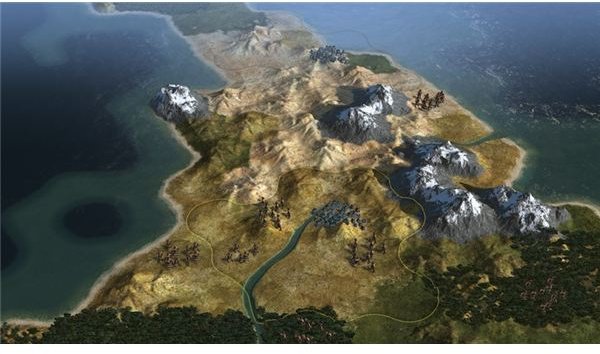
A few months ago, in anticipation of Civilization 5, I reinstalled my old copy of Civilization 2. In that game it is incredibly important to expand quickly. Cities have access to a limited number of resources in their area and their area of control doesn’t expand as the cities grow. It is for this reason very important to expand quickly. A nation in Civilization 2 usually consists of numerous tightly packed cities.
Civilization 5 is different. As cities grow in size and influence they also are able to work more territory. You also have to deal with a happiness mechanic that is no longer tied to each individual city. Instead your entire empire shares the same level of satisfaction. As your cities grow in population you’ll find that it is more and more difficult to keep your empire happy.
In addition, you can’t even build any city improvements that increase happiness until you’ve done the appropriate research. If your empire’s happiness ever goes below zero the growth rate of your cities will be hurt. If your empire becomes severely unhappy (as indicated by the smiley-face icon at the top of the interface) your armies will have a big penalty slapped on to their overall combat effectiveness.
This means that it is very difficult to expand quickly in Civilization 5. It isn’t impossible, but as a new player you probably shouldn’t do it.
When to Expand – The Slow and Steady Method
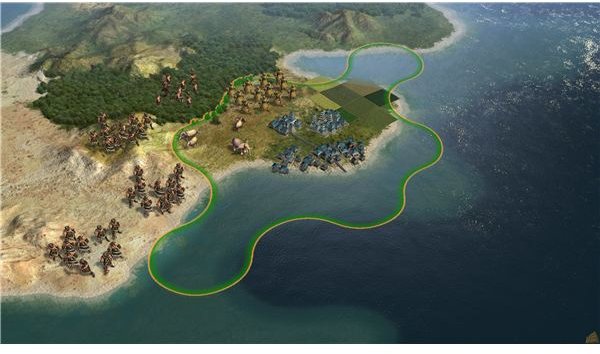
So what should you do? Chill out, scout, and improve the land that you do have by building Workers. Only build new cities once you have found a spot that you believe is appropriate.
When do you know a spot is appropriate? That’s not an easy question to answer, but looking for and building next to luxury resources is a good rule of thumb. Luxury resources, as mentioned, are tiles that have things like gems, cotton, or silk. These resources make your civilization happy. You should also keep an eye out for resources needed to build units, such as iron.
Remember, however, that cities don’t have a set area that they can work. This means you don’t have to settle cities right next to resources. Let’s say, for example, that you want access to some iron – but the resource is right next to a desert. You don’t have to settle your city next to the desert. You can settle a few tiles away in more prosperous lands. Your city will grow and eventually gain access to the resource. You only need to settle right next to resources if you need them immediately – which might be the case now and then, but you’ll usually have the luxury of time.
Shaping Your Civilization for the Long Game
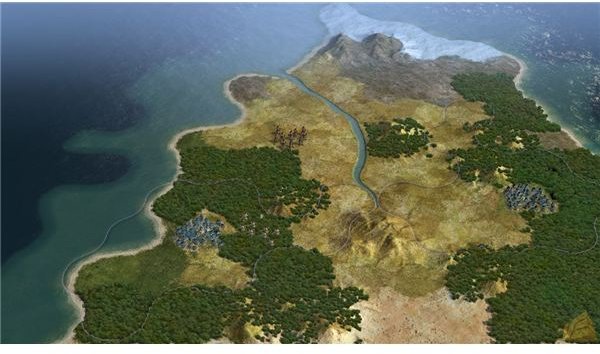
Once you’ve settled your first two or three cities you’re probably 100 to 150 turns into the game. Now is a good time to start thinking about how, exactly, you want to win – if you haven’t already.
There are four ways to win Civilization 5. They are:
Cultural Victory: Complete 5 Social Policy Trees and build the Utopia Project
Diplomatic Victory: Convince other powers to elect you to be the world leader at the United Nations.
Domination Victory: Survive as the last civilization holding on to its capital city.
Science Victory: Be the first to construct a ship to Alpha Centauri
If no one has achieved any victory condition by the year 2050 AD the game will end. The winner is the civilization with the highest overall score.
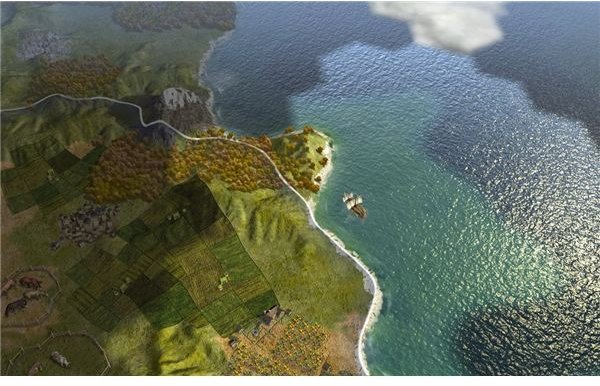
Cultural victory in particular is difficult to manage with a large empire because the culture points required to obtain the new social policies is raised by 30% for each city that is added to your empire.
Diplomatic Victory is dependent on good relations with other nations and also city-states, small states that never expand past a single city. In order to obtain diplomatic victory you’ll have to play nice and woo the different powers in the game. You should begin to explore the map in order to discover the game’s many city-states. You’ll also want to work on a powerful economy so that you have the gold required to bribe city-states into loving you.
Domination Victory obviously depends on a strong military. You’ll want to focus your research and production efforts on military units. Remember, however, that you only need to be the last civilization still in ownership of its capital. You don’t have to take on the world – just take out the remaining capitals.
Finally you have the Science Victory. This obviously relies on research, which is generated by population and science improvements. This means you’ll want large cities with numerous scientific improvements. Expanding can be a good way of increasing your population and thus scientific income, but watch your economy. The buildings that improve research income are expensive to maintain.
Conclusion
These are the basics of Civilization 5 – found a prosperous first city, expand slowly to manage happiness, and set yourself up for the victory condition you wish to pursue.
Obviously, there is much more to it than that, but it is important not to jump into the deep end before you know how to swim. If you’re new to games like Civilization 5 you should pick one of the lower difficulty settings and simply focus on executing what was covered in this article. Later parts of this guide will focus on more advanced topics, like combat and research.
This post is part of the series: The Complete Civilization 5 Guide
Are you a new player to Civilization 5 looking to learn the game? Or a veteran of Civilization 4 looking for some tips about what is new and different? This guide will help you become familiar with the mechanics of Civilization 5.
